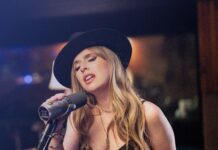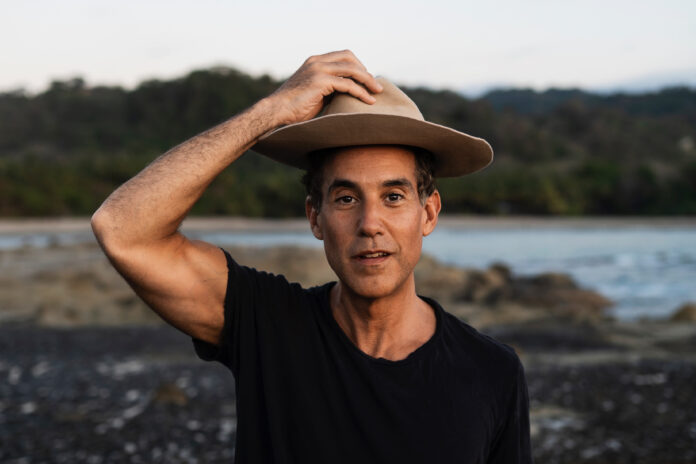
Touring in support of his just released EP, Though The World Will Tell Me So (Volume Two), world-renowned singer-songwriter Joshua Radin is scheduled to play Denver’s Bluebird Theater on Wednesday, October 4. Radin’s music has been featured in more than 200 films, television series, and commercials, and he’s been a national TV regular, having performed on The Today Show, Good Morning America, Jimmy Kimmel LIVE!, Conan, and Ellen.
Radin’s style of introspective, acoustic, folk music has won him worldwide acclaim and a string of high-profile fans, including Ellen DeGeneres (he performed at her wedding to Portia de Rossi), Michelle Obama, and actor Zach Braff (who Radin originally met when they were both students at Northwestern University). His nearly two-decade musical career has seen him release nine full length albums, another nine EPs, and a live set released in 2016.
I caught up with Radin via Zoom earlier this week. He was in Sweden, where he’s spent the summer, splitting time between work and life. Radin has been a self-described nomad for the past several years, having sold his LA home and giving away most of his worldly belongings to travel the world. He’s returning to the United States shortly, and launching a tour that will see him perform 27 shows in 37 nights, covering the US from north to south, and east to west. Included in that tour will be two nights in Colorado – the aforementioned show on October 4 in Denver, and one the night before in Fort Collins.
In our conversation we talked about the nature of touring, his journey to becoming a professional musician, the process behind the release of his Volume One and Volume Two EPs this year, and his involvement with, and support of, nonprofit organizations…
Rick: You’re starting a tour in early September that has you doing 27 shows in 37 nights, covering pretty much every corner of the US. How in the world do you manage to get yourself up for sometimes four or five nights in a row?
Joshua: That’s a great question. You gotta love it. I gotta be honest with you, when I’m on tour, I don’t really love days off. The days off are generally more for the bus driver, the tour manager, the person selling merch. If I had my druthers, I would play every night.
I get pretty tired. But it’s usually during a run like this that even after a week, I’m like, alright, where am I going next? Because, you know, it’s what I love to do every night – play music for people. And the only way I get to do it is being on tour.
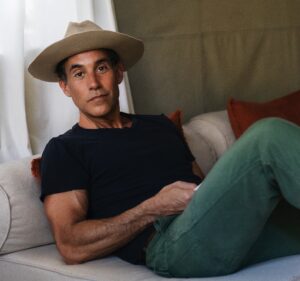
Rick: Let’s talk about your musical journey, because it’s a very interesting one. I interview a lot of people and almost everybody has a story about how they grew up in a family of musicians or had this inspiration as a kid or started playing or performing when they were four years old. That’s not your story. You were living life, and then one day, when you were about 30, you decided you wanted to give music a try.
Joshua: Yeah, not professionally, but I bought a guitar, and I taught myself a few chords. And within about six months, I just figured, “Hey, maybe I should try to write some songs”. You know, I’m a writer already. So maybe I could try my hand. And not only did some commercial success happen pretty quickly, but when I wrote my first few songs, I really felt like I had expressed myself more honestly than I ever had in any creative medium I’d ever attempted. And so it really just felt like this natural, organic thing. I don’t know why it took me so long to try it out. I was a huge, rabid music fan. And I would spend all my money going to concerts or buying records, and just never thought that was something I would be able to do.
It’s a cliché, but a lot of people when they give advice, they say, don’t look at the staircase, look at the first step. And I was always looking at the entire staircase. When I took the first step and realized, now the next step, then the next step, it started to become a lot easier. I wish I had just seen the first step at a young age, but it is what it is, you know, I don’t have any regrets about it. I was just so intimidated by it for so many years. And looking back on it now I find that kind of silly.
Rick: I like what you said about no regrets, because even if you had started down this path, say, ten years earlier, who knows how it might have changed the way things turned out?
Joshua: That’s right. I also think one of the reasons I appreciate the way it went down is that, like I said, I found some success pretty early on, and being 30 years old I was already sort of a fully formed human. Had I found that same commercial success at 20, who knows where my life would have brought me? My priorities might have been different. The choices I made might have been different. So I’m just happy where I’m at, with everything that’s led me up to this point.
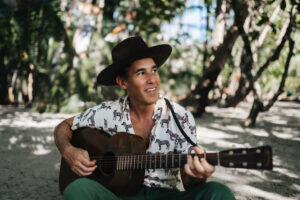
Rick: For a guy who’s been at this less than 20 years, you’ve been very prolific. I’m not going to ask you about your inspiration, because I know that much of it, maybe most or even all of it is very personal. But the question I would ask is this… does it ever take a toll on you that, you know, you’re laying yourself out there, baring your soul all the time? Or is it more cathartic?
Joshua: It’s a bit of both. But I would say it’s more cathartic. With the genre of music that I work in it’s just me and my guitar and the stories that I tell. It’s very intimate. Like you said, it’s very personal. Just a bunch of journal entries. And it’s really helped me, over time, to live my personal life so much more honestly, because I’m always thinking about songs and what I want to express. And I’ve realized over all this time that the better songs I write – the ones I feel like my audience relates to the most – are the ones where I’ve made myself as vulnerable as I possibly can. And that has carried over into my personal life. If you want to write honestly, it forces you to live honestly.
Rick: You just released a new EP a couple of weeks ago – Though The World Will Tell Me So (Volume Two). It’s a follow up to Volume One, which was released in January. Taken together the collection is a story of your recent journeys around the world. Tell us a bit more about them.
Joshua: Yeah, it’s really a travel diary. I recorded in a bunch of different spots all over the world, different musicians, different producers. I’ve been a nomad for the last, over a year and a half. I sold my house in Los Angeles. I gave away most of my possessions. I put a few things in storage. And I’ve just been traveling, touring, Airbnb-ing, Hotel-ling, camping, glamping, you know, just collecting experiences and stories. And I’m so enjoying the “not knowing”.
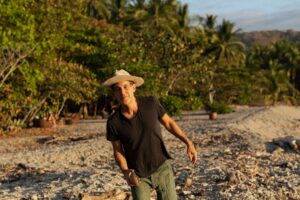
Rick: I love that. My wife is an avid golfer, and I’m just a run-of-the-mill casual golfer, who doesn’t even bother to keep score. It drives her nuts, but I tell her that it’s so liberating not to be tied down to a score.
Joshua: I’ve played some golf in my life. My dad is an avid golfer, so he taught me when I was young. For me, golf is like a meditation in a way. Much like playing guitar is for me. I don’t meditate traditionally, like a lot of people do. I don’t go on yoga retreats or those kind of things. I think those are great for people who have a high stress job, and then have to get away and decompress. And I think a lot of people use a golf course like that. For me, if you see it as a meditation, and if you do keep score, I always thought the lower your score, the better you meditated that day.
It truly is about staying as “present” as you possibly can. And I would say that’s the same when it comes to touring for me. You know, there’s plenty of cities in the world that I really love to play. And then there’s plenty of cities I’ve been to where, early in my touring days, I would think, “Oh, well, we’ve just got to get through this show”. We’re in this tiny little town, but tomorrow we’ll be in New York, or, you know, something like that. And the longer I’ve done this, the more I realized that it’s those little shows that can be easily more gratifying than the bigger ones. Sometimes you find yourself in a little town and a little bar, as a stopover show in between a larger market or something like that. And that really messes me up when I think about it that way, because, you know, there’s always someone in that audience, no matter where you are, that might have driven for hours and has never seen you play and has been wanting to see you play for 10 years. And this is so important to them. And if you go in thinking this show isn’t that important to me, you’re doing such a disservice to that fan. And that’s a real crime.
Our conversation meandered a bit, and at one point Radin talked about friends of his who had traveled from his hometown of Cleveland to see him play at the Bluebird in Denver. Since that’s the venue he’s playing on October 4, I asked him to share any memories he had of the Bluebird…
Joshua: It’s one of my favorite venues in the world, actually. After the world shut down from the pandemic, I was really chomping at the bit to get out there because like everyone, I had to cancel a few tours along the way. And we started in LA, when I sold my house, I hopped on the tour bus, walked out of my house for the last time, played the LA show, got on the bus, and started making our way up the coast. Then we started heading east through the mountains. Everyone in the first few shows were wearing masks, and a lot of the shows weren’t very well attended. People weren’t yet ready to be out in public in a crowded space. By the time we got to Denver, it was about a week and a half into the tour. And that was the first show I remember having so much joy and feeling like this pandemic might actually be over because I didn’t see one mask in the crowd at the Bluebird. And it was sold out. And it was so electric. And I remember walking offstage thinking, “Oh, we’re back”. And it’s one of my favorite memories of the past decade, I would say, on tour.
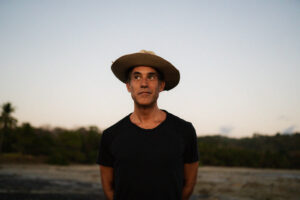
Rick: We don’t have a lot of time left, but before we go I want to ask you about your philanthropic efforts. I understand that you’re a celebrity ambassador for North Shore Animal League America. How did you get involved with that organization?
Joshua: It was through Beth and Howard Stern. I met them randomly in New York. And Beth is such an amazing ambassador for this organization. I didn’t know anything about it. She told me all about it and asked if I would play a benefit for them in the Hamptons at this little venue called Steven Talkhouse, which I had played a bunch of times over the years. It’s a beautiful little dive bar. So I played the benefit and we raised a bunch of money to help a bunch of rescue animals and I’ve just been involved with them ever since. They are such an amazing organization.
Rick: And you’re also involved with an organization called Little Kids Rock… tell me a little bit about them.
Joshua: That’s an amazing organization as well. In most major cities in America, in a lot of inner-city schools, they’ve had to cut their arts funding, because there isn’t enough money for it. Little Kids Rocks has been amazing over the years at donating instruments, and having musicians come and play and inspire and teach. A bunch of times, I’ve brought a group of kids on stage, from the schools, and they learn one of my songs, and we’ll play it together. They’ve never been on a stage before, with a packed theater full of people. And the crowd just goes nuts for him. And you see their faces light up. And you take them on a tour bus. And it really gives them an amazing sort of inspiration.
As you can hopefully tell from this interview, Radin is an exceptionally interesting, introspective, and grounded person – exactly the type of person we want our storytellers to be. That he tells his stories accompanied by an acoustic guitar, or a piano, makes those stories all the more intriguing and accessible. If you’re not familiar with Radin’s music check him out via your favorite streaming service. Better yet, visit his website at https://www.joshuaradin.com/. There you can pick up tickets for either his Fort Collins or Denver shows (why not both?).
Article by Rick Witt
Photos courtesy of Minna Ýr Jóhannsdóttir




